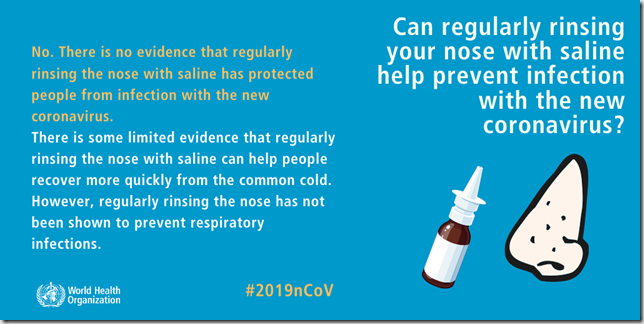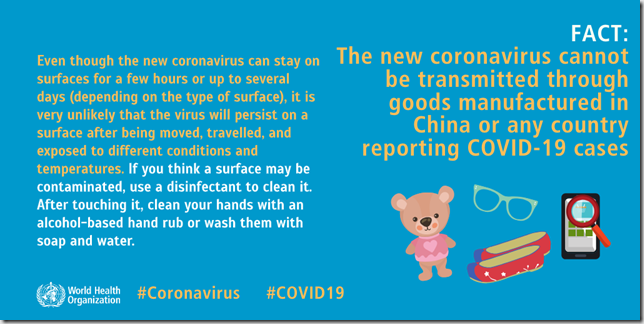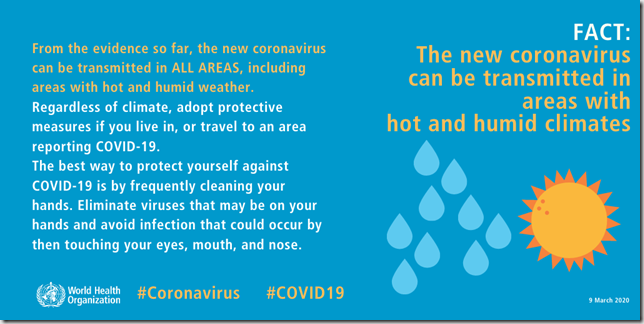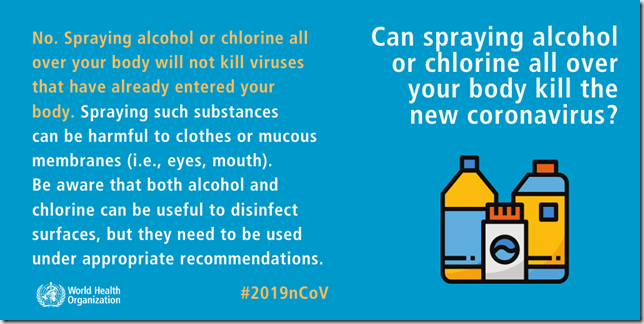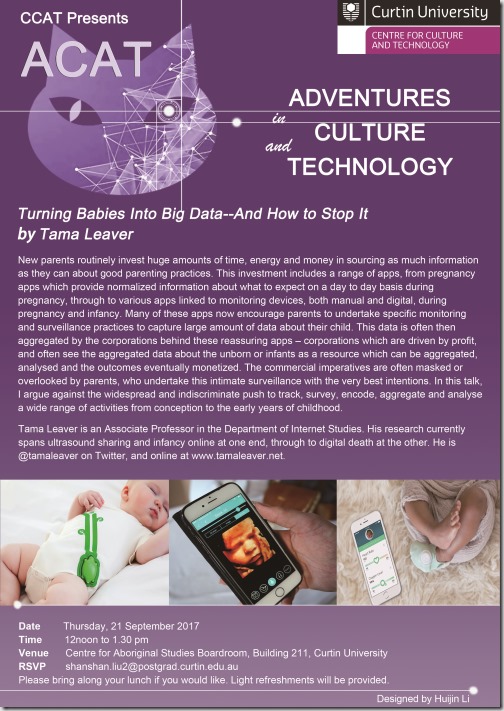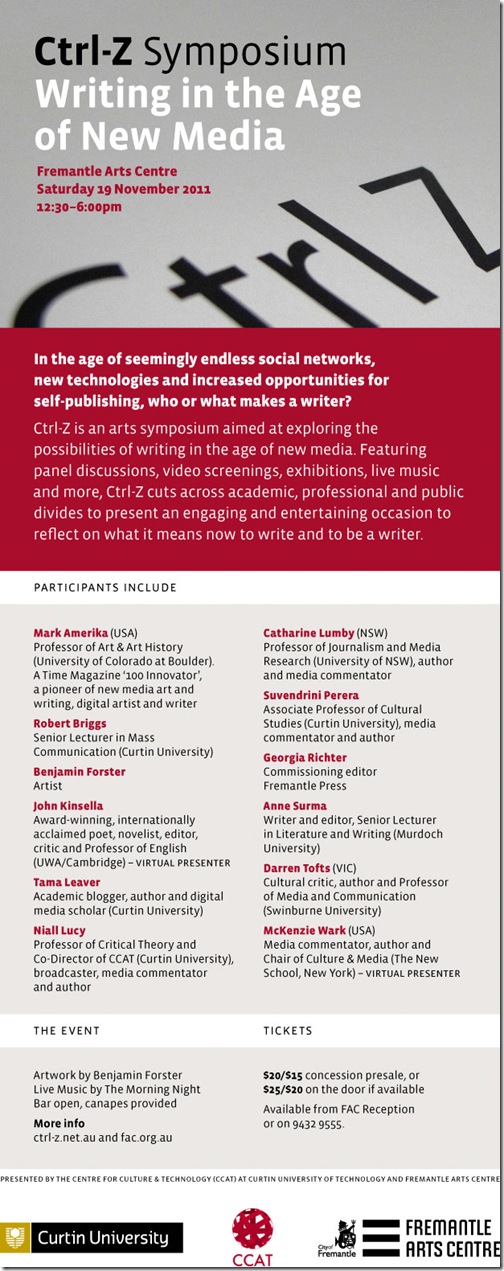Home » Perth
Category Archives: Perth
ABC Perth Spotlight forum: how to protect your privacy in an increasingly tech-driven world
 I was pleased to be part of the ABC Perth Radio’s Spotlight Forum on ‘How to Protect Your Privacy in an Increasingly Tech-driven World‘ this morning, hosted by Nadia Mitsopoulos, and also featuring Associate Professor Julia Powles, Kathryn Gledhill-Tucker from Electronic Frontiers Australia and David Yates from Corrs Chambers Westgarth.
I was pleased to be part of the ABC Perth Radio’s Spotlight Forum on ‘How to Protect Your Privacy in an Increasingly Tech-driven World‘ this morning, hosted by Nadia Mitsopoulos, and also featuring Associate Professor Julia Powles, Kathryn Gledhill-Tucker from Electronic Frontiers Australia and David Yates from Corrs Chambers Westgarth.
You can stream the Forum on the ABC website, or download here.
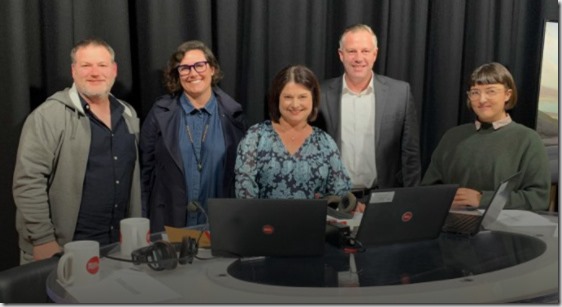
Why the McGowan government will have an uphill battle rebuilding trust in the SafeWA app.
QR code contact-tracing apps are a crucial part of our defence against COVID-19. But their value depends on being widely used, which in turn means people using these apps need to be confident their data won’t be misused.
That’s why this week’s revelation that Western Australian police accessed data gathered using the SafeWA app are a serious concern.
WA Premier Mark McGowan’s government has enjoyed unprecedented public support for its handling of the COVID-19 pandemic thus far. But this incident risks undermining the WA public’s trust in their state’s contact-tracing regime.
While the federal government’s relatively expensive COVIDSafe tracking app — which was designed to work automatically via Bluetooth — has become little more than the butt of jokes, the scanning of QR codes at all kinds of venues has now become second nature to many Australians.
These contact-tracing apps work by logging the locations and times of people’s movements, with the help of unique QR codes at cafes, shops and other public buildings. Individuals scan the code with their phone’s camera, and the app allows this data to be collated across the state.
That data is hugely valuable for contact tracing, but also very personal. Using apps rather than paper-based forms greatly speeds up access to the data when it is needed. And when trying to locate close contacts of a positive COVID-19 case, every minute counts.
But this process necessarily involves the public placing their trust in governments to properly, safely and securely use personal data for the advertised purpose, and nothing else.
Australian governments have a poor track record of protecting personal data, having suffered a range of data breaches over the past few years. At the same time, negative publicity about the handling of personal data by digital and social media companies has highlighted the need for people to be careful about what data they share with apps in general.
The SafeWA app was downloaded by more than 260,000 people within days of its release, in large part because of widespread trust in the WA government’s strong track record in handling COVID-19. When the app was launched in November last year, McGowan wrote on his Facebook page that the data would “only be accessible by authorised Department of Health contact tracing personnel”.
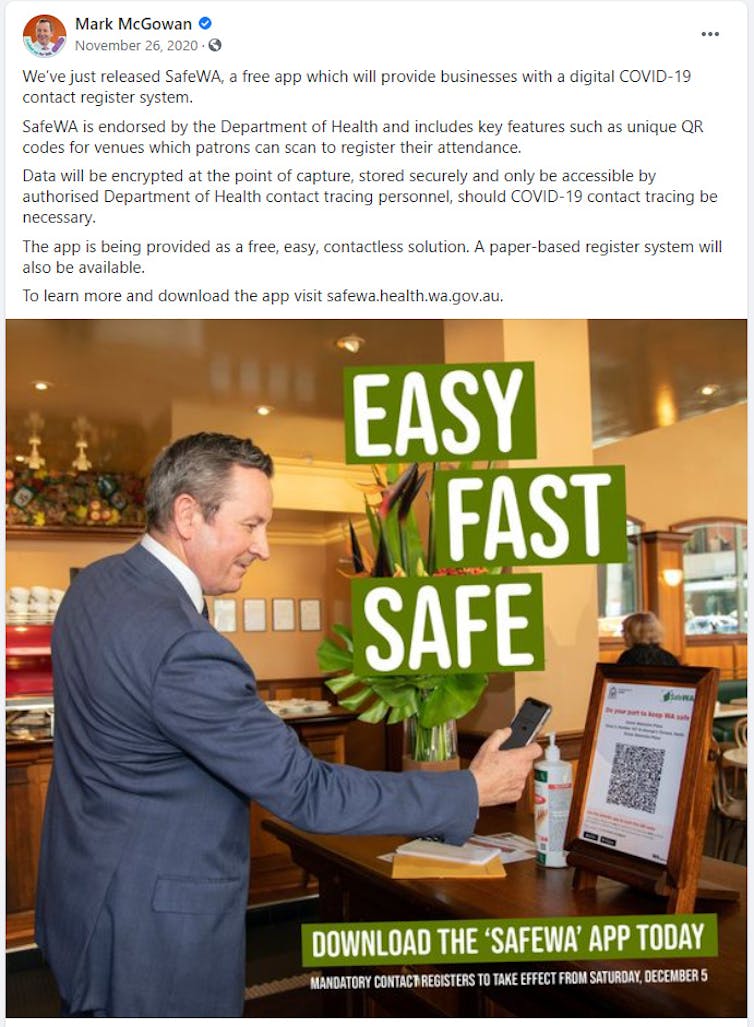
Mark McGowan’s Facebook Page
In spite of this, it has now emerged that WA Police twice accessed SafeWA data as part of a “high-profile” murder investigation. The fact the WA government knew in April that this data was being accessed, but only informed the public in mid-June, further undermines trust in the way personal data is being managed.
McGowan today publicly criticised the police for not agreeing to stop using SafeWA data. Yet the remit of the police is to pursue any evidence they can legally access, which currently includes data collected by the SafeWA app.
It is the government’s responsibility to protect the public’s privacy via carefully written, iron-clad legislation with no loopholes. Crucially, this legislation needs to be in place before contract-tracing apps are rolled out, not afterwards.
It may well be that the state government held off on publicly disclosing details of the SafeWA data misuse until it had come up with a solution. It has now introduced a bill to prevent SafeWA data being used for any purpose other than contact tracing.
This is a welcome development, and the government will have no trouble passing the bill, given its thumping double majority. Repairing public trust might be a trickier prospect.
Trust is a premium commodity these days, and to have squandered it without adequate initial protections is a significant error.
The SafeWA app provided valuable information that sped up contact tracing in WA during Perth’s outbreak in February. There is every reason to believe that if future cases occur, continued widespread use of the app will make it easier to locate close contacts, speed up targeted testing, and either avoid or limit the need for future lockdowns.
That will depend on the McGowan government swiftly regaining the public’s trust in the app. The new legislation is a big step in that direction, but there’s a lot more work to do. Trust is hard to win, and easy to lose.
Tama Leaver, Professor of Internet Studies, Curtin University
This article is republished from The Conversation under a Creative Commons license. Read the original article.
The Future Of Children’s Online Privacy
I was delighted to join Dr Anna Bunn, Deputy Head of Curtin Law School, and the Future Of team for a podcast interview all about Children’s Online Privacy.
The half hour podcast is online here in various formats, including shownotes, or embedded in this post:
We discuss:
What’s the impact of parents sharing content of their children online? And what rights do children have in this space?
In this episode, Jessica is joined by Dr Anna Bunn, Deputy Head of Curtin Law School and Tama Leaver, Professor of Internet Studies at Curtin University to discuss “sharenting” – the growing practice of parents sharing images and data of their children online. The three examine the social, legal and developmental impacts a life-long digital footprint can have on a child.
- What is the impact of sharing child-related content on our kids? [04:08]
- What type of tools and legal protections would you like to see in the future to protect children? [16:30]
- At what age can a child give consent to share content [18:25]
- What about the right to be forgotten [21:11]
- What’s best practice for sharing child-related content online? [26:01]
Targeted PhD Projects with Scholarship in Internet Studies @ Curtin Uni (to start 2021, applications close 1 Sept 2020)
Opportunities exist to apply for a range of targeted PhD scholarships located within the Internet Studies Discipline at Curtin University. The window of opportunity for these is short, so if you’re interested, please email the contact person listed in the specific project pages as soon as you’re able!
If folks could share these opportunities with current and recent Masters and Honours completions (and those completing this year), we would be grateful!
The projects available:
1. An Ethnography of Influencers and Social Justice Cultures https://scholarships.curtin.edu.au/Scholarship/?id=4270
2. Analysing Virtual Influencers: Celebrity, Authenticity and Identity on Social Media https://scholarships.curtin.edu.au/Scholarship/?id=4324
3. Climate Action and the Internet https://scholarships.curtin.edu.au/Scholarship/?id=4285
4. Digital Disability and Disability Media https://scholarships.curtin.edu.au/Scholarship/?id=4318
5. Digital Disability Inclusion across the Lifecourse https://scholarships.curtin.edu.au/Scholarship/?id=4291
6. Digital intimacies and social media https://scholarships.curtin.edu.au/Scholarship/?id=4286
7. Diversity, Equity and Impact: Exploring the Open Knowledge performance of Universities https://scholarships.curtin.edu.au/Scholarship/?id=4341
8. Ethical and Sociocultural Impacts of AI/Autonomous Machines as Communicators https://scholarships.curtin.edu.au/Scholarship/?id=4360
9. Tracking Australia’s Research Response to the COVID Pandemic https://scholarships.curtin.edu.au/Scholarship/?id=4347
10. The Audio Internet https://scholarships.curtin.edu.au/Scholarship/?id=4322
To apply for these project opportunities applicants must submit an email to the contact Project lead listed on the project listing. The email must include their current curriculum vitae, a summary of their research skills and experience and the reason they are interested in this specific project.
The Project Lead will select one preferred applicant for this project and complete a Primary reference on their behalf.
After confirmation from the Project Lead that they will receive a primary reference for this project the applicant must submit an eApplication [https://study.curtin.edu.au/applying/research/#apply] for admission into the applicable HDR course no later than 1st September 2020.
All applicants must send an external referee template [https://scholarships.curtin.edu.au/wp-content/uploads/sites/8/2020/07/RTP2021-Round-2-External-Referee-Report.pdf] to their chosen external reference.
All references are confidential and must be submitted by the referee directly to HDRSCH-applications@curtin.edu.au no later than 1st September 2020.
Scholarship applications submitted without a primary reference or a completed application for admission will be considered incomplete.
For further information on the application process or for more RTP2021 Round 2 scholarship project opportunities visit: https://scholarships.curtin.edu.au/hdr-scholarships-funding/rtp-policy/
Thanks for sharing!
Talking about Coronavirus/covid19 and misinformation online
I spoke with Hilary Smale on ABC Perth Radio’s Focus program this morning about Coronavirus/ COVID19 and the challenges of misinformation (or what’s now called an ‘infodemic’ on social media). You can hear the program here: https://www.abc.net.au/radio/perth/programs/focus/corona-reset/12046430 (I’m on at about 29.30 in the recording).
My main advice to all social media users remains: slowing down and checking in with known credible sources *before sharing* is vital in stopping misinformation spreading rapidly online (even that sharing is done with the best of intentions).
Locally, the most reliable source remains the WA Health Department, and their specific page with up-to-date COVID19 information, here: https://ww2.health.wa.gov.au/Articles/A_E/Coronavirus
Their official daily snapshot comes in a particularly shareable visual form:
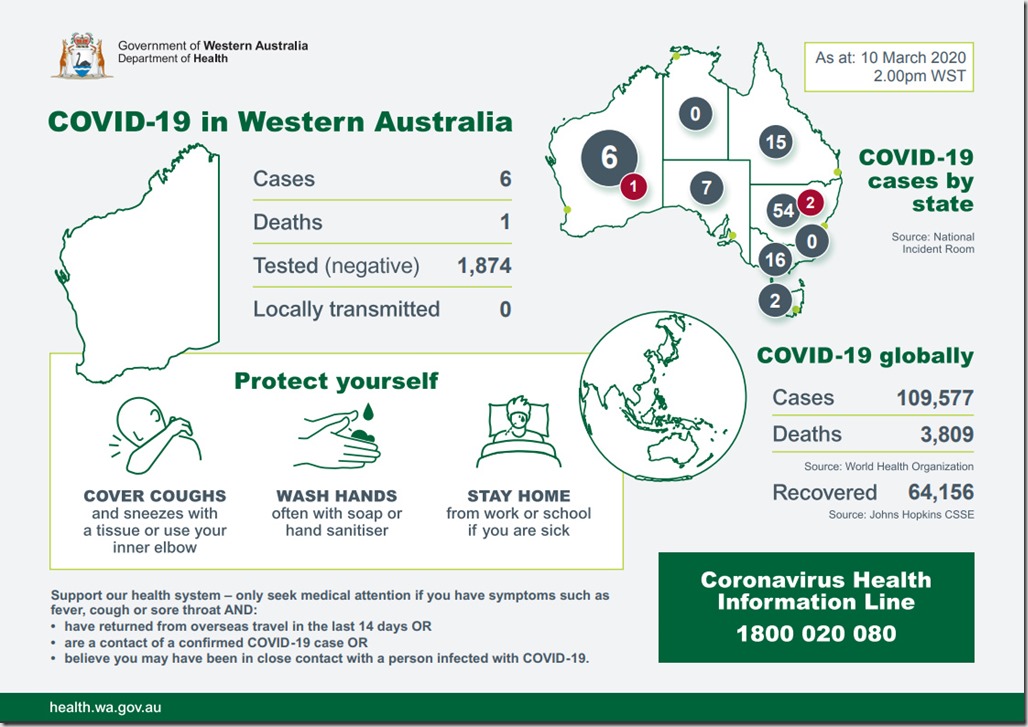
[Example of WA Health Department COVID-19 Infographic for 10 March 2020.]
Nationally, the Australian Government’s Department of Health website remains the best national resource for reliable information (despite, to be fair, a really unfriendly website): https://www.health.gov.au/health-topics/novel-coronavirus-2019-ncov.
Finally, the World Health Organization (WHO) not only provides a reliable global overview but also, vitally, addresses many online rumours about COVID-19 and answers with known facts! https://www.who.int/emergencies/diseases/novel-coronavirus-2019/advice-for-public/myth-busters
[Examples of World Health Organisation Mythbusting Images, 10 March 2020.]
Three Upcoming Infancy Online-related events
Over the next month, I’m lucky enough to be involved in three separate events focused on infancy online, digital media and early childhood. The details …
[1] Thinking the Digital: Children, Young People and Digital Practice – Friday, 8th September, Sydney – is co-hosted by the Office of the eSafety Commissioner; Institute for Culture and Society, Western Sydney University; and Department of Media and Communications, University of Sydney. The event opens with a keynote by visiting LSE Professor Sonia Livingstone, and is followed by three sessions discussing youth, childhood and the digital age is various forms. While Sonia Livingstone is reason enough to be there, the three sessions are populated by some of the best scholars in Australia, and it should be a really fantastic discussion. I’ll be part of the second session on Rights-based Approaches to Digital Research, Policy and Practice. There are limited places, and a small fee, involved if you’re interested in attending, so registration is a must! To follow along on Twitter, the official hashtag is #ThinkingTheDigital.
The day before this event, Sonia Livingston is also giving a public seminar at WSU’s Parramatta City campus if you’re in able to attend on the afternoon of Thursday, 7th September.
[2] The following week is the big Digitising Early Childhood International Conference 2017 which runs 11-15 September, features a great line-up of keynotes as well as a truly fascinating range of papers on early childhood in the digital age. I’m lucky enough to be giving the conference’s first keynote on Tuesday morning, entitled ‘Turning Babies into Big Data–And How to Stop it’. I’ll also be presenting Crystal Abidin and my paper ‘From YouTube to TV, and Back Again: Viral Video Child Stars and Media Flows in the Era of Social Media‘ on the Wednesday and running a session on the final day called ‘Strategies for Developing a Scholarly Web Presence during a Higher Degree & Early Career’ as part of the Higher Degree by Research/Early Career Researcher Day. It should be a very busy, but also incredibly engaging week! To follow tweets from conference, the official hashtag is #digikids17.
[3] Finally, as part of Research and Innovation Week 2017 at Curtin University, at midday on Thursday 21st September I’ll be presenting a slightly longer version of my talk Turning Babies into Big Data—and How to Stop It in the Adventures in Culture and Technology series hosted by Curtin’s Centre for Culture and Technology. This is a free talk, open to anyone, but please either RSVP to this email, or use the Facebook event page to indicate you’re coming.
Open Access Week 2014
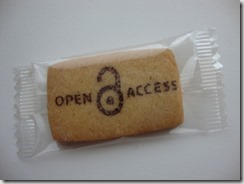 So, it’s Open Access Week this week, and just in case you’ve not been paying attention, yes, I am a fan. Open access journals like the fantastic Fibreculture ensure anyone – whether in academia or anywhere else – can read the work published there (including my own Olympic Trolls: Mainstream Memes and Digital Discord?). Gold open access (proper, full, unrestricted) is the best, but ‘green’ open access arrangements also mean that many commercial publishers at least allow authors to share an early version of their work, so while you might not be able to access the final published version, at least a post-print (a version not formatted and edited by the journal, but still 100% the same content) can be hosted elsewhere, which is why you can read Joss Whedon, Dr. Horrible, and the Future of Web Media over at Academia.edu.
So, it’s Open Access Week this week, and just in case you’ve not been paying attention, yes, I am a fan. Open access journals like the fantastic Fibreculture ensure anyone – whether in academia or anywhere else – can read the work published there (including my own Olympic Trolls: Mainstream Memes and Digital Discord?). Gold open access (proper, full, unrestricted) is the best, but ‘green’ open access arrangements also mean that many commercial publishers at least allow authors to share an early version of their work, so while you might not be able to access the final published version, at least a post-print (a version not formatted and edited by the journal, but still 100% the same content) can be hosted elsewhere, which is why you can read Joss Whedon, Dr. Horrible, and the Future of Web Media over at Academia.edu.
Instead of blowing my own trumpet further, though, I’d rather talk about two recent open access developments that are far more interesting. The first is a truly outstanding collaboration by a group from the Association of Internet Researchers (and the Selfies Research Network on Facebook) who’ve created an open access, Creative Commons licensed, Selfies course. Each of the six weeks covers a particular perspective or area relating to selfies, with readings, provocations, suggested assignments and, of course, selfie activities. The breadth of ideas, and structured learning activities, make this a great course in its own right, but even more impressively it’s explicitly presented as material that can be used, explored, utilised and built on by other educators across a range of disciplines and levels. This sort of collaboration and sharing epitomises the very best of open access education, and it doesn’t hurt that the people behind it are some of the smartest thinkers about online culture around today.
So, kudos and well done to the talented group who’ve created this amazing resource, namely: Theresa Senft (New York University, USA); Jill Walker Rettberg (University of Bergen, Norway); Elizabeth Losh (University of California, San Diego, USA); Kath Albury (University of New South Wales, Australia); Radhika Gajjala (Bowling Green State University, USA); Gaby David (EHESS, France); Alice Marwick (Fordham University, USA); Crystal Abidin (University of Western Australia, Australia); Magda Olszanowski (Concordia University, Canada); Fatima Aziz (EHESS, France); Katie Warfield (Kwantien University College, Canada); and Negar Mottahedeh (Duke University, USA).
I’ll be attending the preconference event Show Me Your Selfies: A pedagogy workshop where we’ll be discussing selfies and the selfies course, which should be a wonderful and stimulating morning, and a great lead in to Internet Research 15 which is in Daegu, South Korea this week.
Secondly, and speaking of amazing open access work, I was ever so pleased to get my hands on Jill Walker Rettberg’s new book Seeing Ourselves Through Technology: How We Use Selfies, Blogs and Wearable Devices to See and Shape Ourselves. It’s a fabulous and timely read, situating selfies, quantitifed selves and other recent phenomena with historical context, but also asking fascinating questions – and giving quite a few answers – about where these forms are going. Jill will have hardcopies of the book at IR15, but it’s completely open access, which means anyone – yes, that means you – can download and read it for free in a range of formats right now! (Update: You can read Jill’s detailed thinking behind paying for an open access monograph here.)
Looking back towards Perth, here’s a video I participated in put together by Curtin Library talking about why open access matters to researchers:
I’m the last talking head, and the bit of my interview they used is where I emphasise the importance of The Conversation using a Creative Commons open access license that explicitly gives permission for the work to be republished elsewhere. I know from first-hand experience, a piece in The Conversation can turn up in a lot of different places.
If you’re in Perth this week, there are lots of events on for Open Access Week run by Curtin Library, the details of which are here!
Enjoy Open Access Week: it’s all about sharing, after all!
[Photo by biblioteekje CC BY NC SA]
Who Do You Think You Are 2.0?
At today’s first day of the Perth CCI Symposium I presented the next section of my ongoing Ends of Identity research project as part of the Cultural Science session. I’ve attempted to use the BBC TV series Who Do You Think You Are? to explore how social media both before, during and after our lives shapes, frames and reframes who ‘we’ are in various ways.
As always, comments, questions and criticism are most welcome! ![]()
Ctrl-Z Symposium: Writing in the Age of New Media
This Saturday I’ll be participating in the Ctrl-Z Symposium at Fremantle Arts Centre. It’s broadly exploring ideas of ‘writing’ with a focus on new media (being very conscious of the provocative nature of that term, especially its newness!). The symposium is the first big event arranged under the umbrella of Curtin’s new Centre for Culture and Technology, and the title is shared by the upcoming Ctrl-Z journal which will launch next year. You can find the programme here and a spiffy flyer below. If you’re in Perth and free, it’d be great if you can join the discussions this weekend. The event kicks off at 1pm.
Digital Culture Links: June 6th 2011
- Parents using Facebook to attack school staff, Principals Federation says [Perth Now] – “Parents are using Facebook and other social networks to attack principals and teachers they dislike or believe have wronged them or their children. The growing practice of raging against school staff online has sparked calls for the Education Department to step in. “These forums can also fuel the sort of misplaced anger and hatred that can end in physical confrontations and school lockdowns,” Australian Principals Federation president Chris Cotching said. Lawyers acting for the federation have warned the department it could be legally culpable if it continued to ignore online campaigns against staff.”
- Palin Fans Trying to Edit Wikipedia Paul Revere Page [Little Green Footballs] – Interesting case study on Wikipedia’s accuracy – after Sarah Palin gets history wrong, her supporteres try and edit Wikipedia to make the Palin version; drama and editorial warfare ensue: “Man, you’ve gotta almost admire the sheer blind dedication of Sarah Palin’s wingnut acolytes. Now they’re trying like crazy to edit the Wikipedia page for “Paul Revere” to make it match Palin’s botched version of history. Here’s the Revision history of Paul Revere; check out the edits that are being reversed. Also see the discussion page for an entertaining exchange between Wikipedia editors and a would-be revisionist.”
- Google Chrome: Lady Gaga [YouTube] – Clever ad for Google Chrome featuring Lady Gaga (and simultaneously a Lady Gaga ad featuring Chrome!) which really highlights how she’s deeply engaging with her fanbase via social media.
- Google’s YouTube policy for Android users is copyright extremism [guardian.co.uk] – Cory Doctorow laments Google’s copyright-driven philosophical contradictions: “The news that Android users who have jailbroken their phones will be denied access to the new commercial YouTube pay-per-view service is as neat an example of copyright extremism as you could hope for. Android, of course, is Google’s wildly popular alternative to Apple’s iOS (the operating system found on iPhones and iPads). Android is free and open – it costs nothing to copy, it can be legally modified and those modifications can be legally distributed […] unless you’re running a very specific version of Google’s software on your phone or tablet, you can’t “rent” movies on YouTube. Google – the vendor – and the studios – the rights holders – are using copyright to control something much more profound than mere copying. In this version of copyright, making a movie gives you the right to specify what kind of device can play the movie back, and how that device must be configured.”

